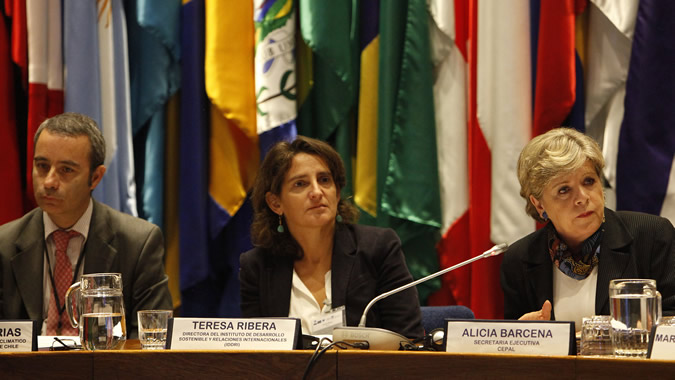News
(9 October 2014) "The greenhouse gas emissions that cause climate change are ever greater and mitigation commitments, above all in developed countries but also in emerging economies, are not enough to stabilize climate conditions," the Executive Secretary of the Economic Commission for Latin America and the Caribbean (ECLAC), Alicia Bárcena, warned at the start of two meetings at the organization's headquarters in the Chilean capital.
The United Nations official indicated that the need to reach a global agreement, based on a true technological revolution and capable of converging with the post-2015 development agenda, is becoming more urgent every day, as is the study of the link between climate change and inequality.
In her opinion, the 20th session of the Conference of the Parties to the United Nations Framework Convention on Climate Change (COP 20), which will be held in December in Lima, Peru, represents a unique opportunity for the region to send a strong message to that effect.
Bárcena participated on Wednesday, October 8 in the joint inauguration of the III Workshop of the Latin American and Caribbean Platform on Low Emission Development Strategies (LEDS LAC) and the Meeting of Latin American and Caribbean Think Tanks on Sustainable Development and Climate Change: Reflections in Preparation for the COP 20 in Lima.
She was accompanied by Fernando Farías, Head of the Office of Climate Change at the Chilean Environment Ministry and President of the Executive Committee of the LEDS LAC Platform; and Teresa Ribera, Director of the Institute for Sustainable Development and International Relations (IDDRI). Margarita Astrálaga, Regional Director for Latin America and the Caribbean at the United Nations Environment Program (UNEP), was also present.
According to ECLAC's recently launched document The economics of climate change in Latin America and the Caribbean: Paradoxes and challenges, the economic costs of climate change could vary between 1 and 4.5% of the annual Gross Domestic Product (GDP) of Latin America and the Caribbean, in the case that the temperature rises 2.5° C above the historical average. Adaptation measures, therefore, are estimated at around 0.5% of regional annual GDP.
"Our production and consumption patterns are at the bottom of the problem. We have already reached some worrisome limits in terms of the carrying capacity of ecosystems and the absorption of greenhouse gases," Bárcena summarized, calling on the region's countries to focus their efforts on decisions to invest in infrastructure, which is a bridge between the present and a desirable future.
Meanwhile, Fernando Farías recalled the recent commitment made by the Chilean government to reduce polluting emissions by 20% as of 2020. To achieve that, he said "the country needs to work on low-emission development strategies in the long term, aimed at decoupling economic and social growth from the increase in greenhouse gas emissions."
Teresa Ribera, from IDDRI, contended that Latin America and the Caribbean "is one of the most important regions for achieving success in the coming months" on the definition of a global climate agreement, considering its historic commitment, the hosting of the COP 20 in Lima, and the fact that the region "combines all the difficulties, concerns, differences and points in common" that exist worldwide with regard to this issue.
The workshop of the Platform LEDS LAC, which will conclude its work on Friday, is organized by ECLAC and the Chilean Environment Ministry, with support from the LEDS LAC Secretariat, the IDB, the World Bank, the UNDP and the Euroclima Program, financed by the European Union.
During the gathering, participants will share experiences, good practices and lessons learned. They will also take part in trainings and establish ways of collaborating on low-carbon development and climate change.
Meanwhile, the meeting of the Latin American and Caribbean think tanks is organized by ECLAC and IDDRI, with support from the Euroclima Program.
The Regional Workshop on Pollutant Release and Transfer Registers, which is supported by the Organization for Economic Cooperation and Development (OECD), will take place on Thursday, also at ECLAC.



